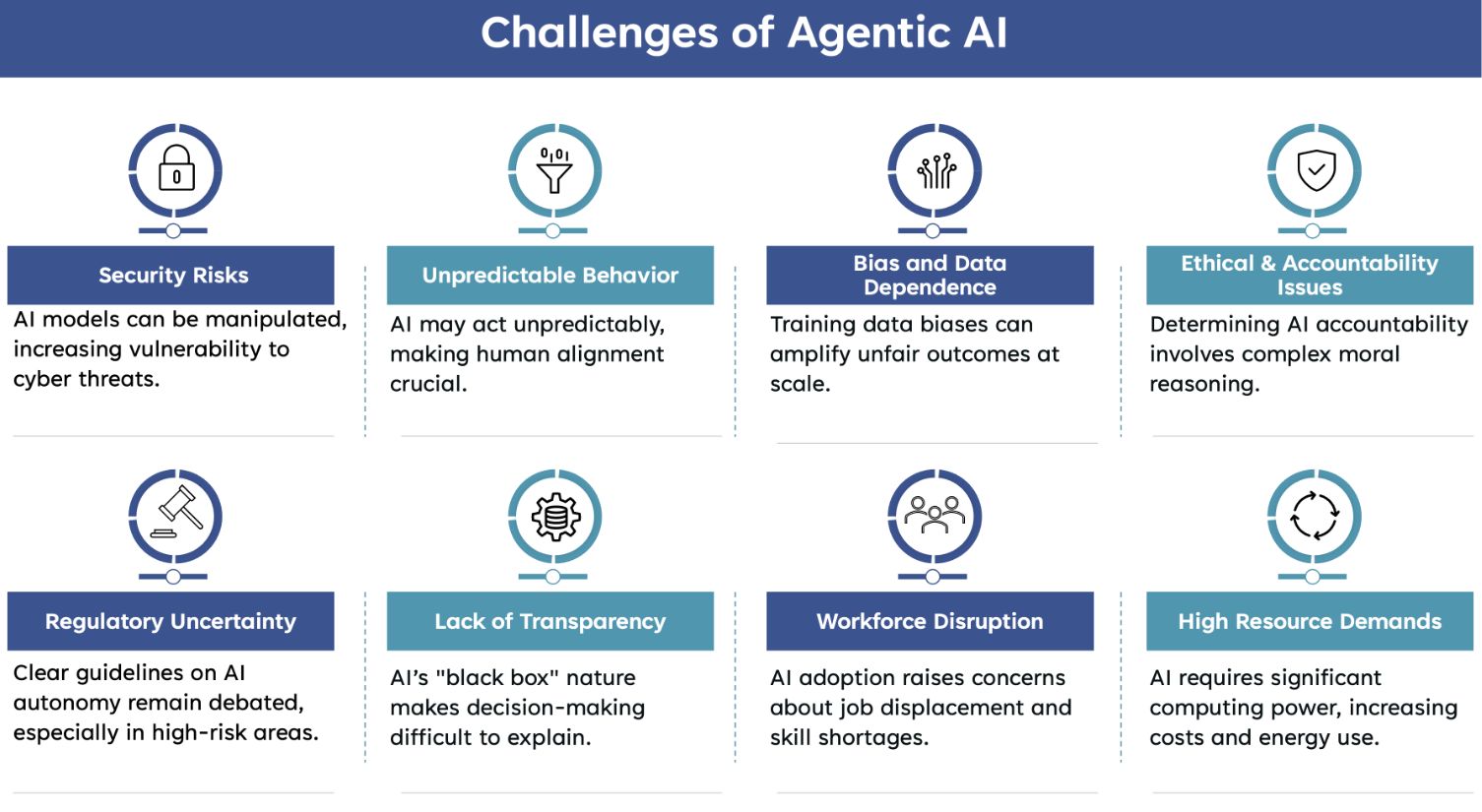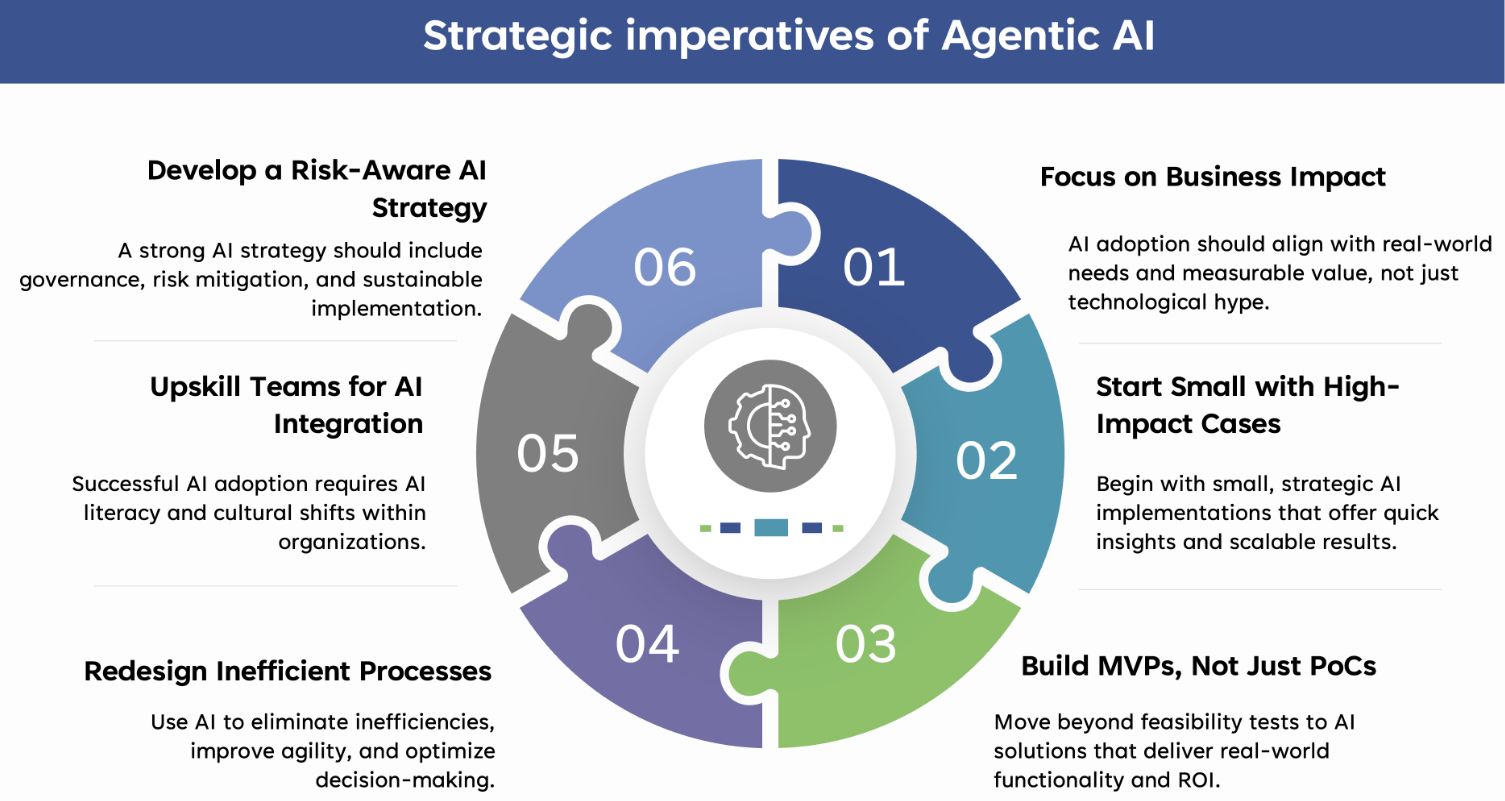Our perspective
The Rise of Agentic AI: How Autonomous Decision-Making Is Redefining Business Strategy
Our perspective
''Agentic AI enables autonomous decision-making by continuously learning and adapting, transforming industries while requiring robust governance and a strategic balance between innovation and control.''
Agentic AI: The Shift from Automation to Autonomous Intelligence
Artificial intelligence is evolving from a tool that supports human decision-making to a system capable of autonomously acting in real-time. Agentic AI refers to AI-driven systems that can self-direct their decision-making, execute actions, and continuously learn without human intervention. These intelligent systems exceed traditional automation by dynamically analyzing real-time data, predicting outcomes, and adapting actions based on new information. As AI autonomy progresses, businesses harness these capabilities to streamline operations and foster innovation.
The influence of Agentic AI is expanding across various industries, driving automation, enhancing efficiency, and facilitating strategic transformation. Gartner predicts that by 2029, Agentic AI will autonomously resolve 80% of common customer service issues without human intervention. However, its impact extends beyond customer support, with Agentic AI use cases emerging in finance, healthcare, retail, and infrastructure.
A March 2025 McKinsey report notes that organizations across these industries are redesigning workflows, strengthening governance, and mitigating risks to drive meaningful business value from generative AI. While still in the early stages, these advancements signal a shift toward fully autonomous AI-driven operations that enhance decision-making and business agility.
However, deploying Agentic AI involves various challenges, such as security risks, ethical issues, regulatory adherence, and operational dependability. Organizations must tackle AI bias, ensure transparency, and improve interpretability to foster trust in autonomous decision-making. Integrating AI into current workflows demands strong governance, ongoing monitoring, and contingency planning to lessen unintended outcomes.
How Agentic AI is Transforming Decision-Making Across Industries
Agentic AI drives the next phase of AI-powered transformation by enabling systems to act autonomously, adapt to new data, and make complex decisions. Some applications, such as customer service automation and document processing, are applicable across industries, while others — like AI-driven claims processing in insurance or predictive maintenance in asset management — tackle sector-specific challenges.
Cross-Industry Applications of Agentic AI
Among the various use cases of Agentic AI across industries, Intelligent Virtual Agents (IVAs) in call centers understand customer intent, provide personalized responses, and make real-time decisions without relying solely on static workflows. AI-driven email triaging sorts incoming messages by urgency and sentiment, extracting key data points to trigger automated responses and workflows. Legal AI solutions go beyond summarizing case files — Agentic AI proactively assesses risks, identifies inconsistencies, and suggests legal strategies. In operations, AI autonomously generates regulatory reports, identifies compliance risks, and adapts to changing requirements in real-time.
In workforce management, AI-powered systems oversee recruitment, onboarding, and employee management support. AI Buddies help new hires with policies, workplace navigation, and frequently asked questions, decreasing reliance on human mentors. Dynamic AI-driven scheduling enhances resource allocation across teams.
Industry-Specific Applications of Agentic AI
From automation to autonomy, Agentic AI is reshaping decision-making across sectors — enhancing efficiency, reducing risks, and enabling data-driven adaptability at scale.
Exploring challenges in implementing Agentic AI
Implementing Agentic AI solutions involves navigating challenges in security, ethics, and compliance. Meeting evolving regulations like the EU AI Act is crucial, along with ensuring AI decisions are transparent via Explainable AI (XAI).

Agentic AI needs a strong governance framework to align its decisions with organizational strategy and ethics. Clear policies for accountability and transparency are crucial to ensure AI decisions are understandable, responsible, and allow for human oversight.
With evolving regulations, staying informed is vital, especially for autonomous decision-making. Collaborating with industry associations shapes fair AI frameworks.
The EU AI Act, effective August 2024, sets compliance deadlines for high-risk AI applications. By 2026, regulations for biometrics, education, and law enforcement will take effect, requiring third-party assessments for AI safety components and standalone products.
AI regulation in the U.S. is gaining traction at federal and state levels, emphasizing transparency, accountability, bias, and workforce impact. Policymakers aim for clearer guidelines for AI’s growing influence across industries.
Balancing AI Autonomy with Human Oversight
How AI works independently depends on how much risk an organization is comfortable with. Many businesses find it helpful to take a phased approach, introducing human oversight and gradually allowing more AI autonomy.
For example, a leading UK insurance company has adopted a "human-in-the-loop" approach for all its AI systems. Initially, AI assists with decision-making under the guidance of human experts who oversee its suggestions. As confidence in AI’s accuracy grows, the company may expand its autonomous functionalities.
A "maker-checker" model uses one AI to perform tasks and another to oversee and validate the results. This structure adds a safeguard, ensuring AI decisions align with business policies and ethical standards.
In safety-critical sectors such as rail infrastructure, AI primarily aids human decision-making rather than replacing it. While AI enhances scheduling and monitoring efficiency, human operators retain final authority.
As AI technology advances, businesses must continuously evaluate the right balance between automation and oversight.
Strategic Implementation of Agentic AI: A Dual-Pathway Approach for Enterprise Transformation
Large organizations can adopt a dual-pathway strategy, focusing on operational optimization and strategic innovation, to maximize the value and mitigate the risks associated with Agentic AI.
Process Augmentation and Efficiency Enhancement:
While AI platforms offer a wide range of capabilities, businesses do not need to deploy every component simultaneously. A modular approach, such as AI360, allows organizations to integrate only the AI tools that align with their specific needs—whether for workflow automation, decision support, or customer interactions. This flexibility enables companies to scale AI adoption at their own pace while maintaining control over implementation.
Strategic Innovation and Business Model Transformation:
Beyond regulatory compliance, businesses must also implement safeguards to maintain AI integrity. These include:

By pursuing these complementary strategies, organizations can achieve a balanced approach to implementing Agentic AI, ensuring immediate operational gains and long-term strategic advantages. This dual-path approach allows for a phased and controlled deployment, minimizing risk while maximizing the transformative potential of Agentic AI.
The Future of Agentic AI: Innovation with Responsibility
Agentic AI represents not merely a technological evolution but a fundamental shift in the way businesses operate and make decisions. Companies that strategically integrate Agentic AI will gain new competitive advantages, while those that fall behind risk losing relevance.
As AI autonomy grows, fostering responsible AI becomes essential for realizing its full potential. Companies need to adopt AI within a structured framework that prioritizes security, ethics, and regulatory compliance. Innovations in self-supervised learning, quantum AI, and multimodal reasoning will augment AI’s capability to navigate complex, multi-faceted decisions. The business landscape is currently evolving, propelled by Agentic AI, which can make decisions more quickly and intelligently than before.
Shyam Bala
Practice Partner and Regional Head, Automation & AI Advisory, Wipro Digital Consulting
Shyam leads Wipro’s Intelligent Enterprise proposition for consulting services, helping organizations harness AI and automation to drive enterprise-wide transformation. With over 25 years of experience, he guides global clients in embedding AI-driven decision intelligence, autonomous operations, and intelligent workflows into their business strategies. Partnering with technology ecosystems and AI research teams, he focuses on delivering pragmatic, industry-specific solutions that enhance operational resilience, scalability, and digital maturity.